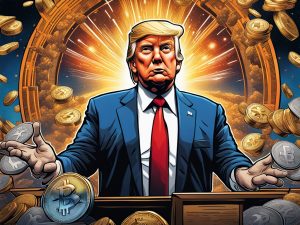Trump Voices Concerns Over Taiwan’s Chip Industry ⏳
During a recent appearance on “The Joe Rogan Experience” podcast, former President Donald Trump expressed his discontent with Taiwan, alleging the island has unfairly appropriated America’s semiconductor industry. He suggested that if he were to be elected president again, he would impose tariffs on chips imported from Taiwan, a move that could significantly affect the globally recognized leader in chip manufacturing, Taiwan Semiconductor Manufacturing Company (TSMC).
Impact on Taiwan Semiconductor and Market Reactions 📉
Stocks of Taiwan Semiconductor experienced a decline of 4.3% on Monday following Trump’s remarks. He stated, “You know, Taiwan, they stole our chip business … and they want protection,” during his podcast interview released on Saturday. Such comments have the potential to escalate tensions between the U.S. and Taiwan.
- Many major tech firms, including:
- Amazon
- Microsoft
- heavily rely on TSMC for chip production.
According to analysts from UBS, TSMC is responsible for more than 90% of the world’s advanced semiconductors. Although companies like Intel and Samsung are attempting to compete, they have encountered numerous obstacles along the way.
Geopolitical Concerns and Business Pressure 🤔
With rising geopolitical issues surrounding Taiwan, particularly the fears of a possible invasion by China, many U.S. firms are feeling pressure to establish alternative semiconductor manufacturing capabilities within the United States. Intel has taken the lead in advocating for domestic chip production, but challenges persist.
Bernstein analyst Stacy Rasgon highlighted that the focus should not be on the nationality of the chipmakers themselves, but rather on developing state-of-the-art infrastructure within the U.S. Rasgon dismissed Trump’s notion of Taiwan having taken the U.S. chip industry as “ridiculous.”
Funding Developments: The CHIPS Act 🏗️
TSMC aims to receive nearly $7 billion from the U.S. Commerce Department to support the establishment of its Arizona facility, which forms part of the CHIPS Act incentive. During a recent earnings call, TSMC’s CEO CC Wei indicated that the operations in Arizona are progressing well, with output expected to rise in 2025.
Currently, funding from the U.S. Commerce Department has yet to be distributed to TSMC or any other significant semiconductor enterprises. There are expectations that funds will be allocated by the end of this year contingent upon the achievement of specific milestones.
Trump’s Call for Policy Changes 🔍
Trump criticized the practice of allowing foreign companies to enter the U.S. and utilize government funding, dubbing the current semiconductor funding model as highly unfavorable. He remarked, “That chip deal is so bad,” insisting that U.S. taxpayer dollars should not support wealthy companies coming into the market and leveraging those funds to establish their chip operations on American soil.
Market Implications and Expert Opinions 📊
Recent assessments by Mizuho analysts suggest that a potential Trump victory could pose a threat to TSMC’s position, while Citi analysts have begun evaluating the ramifications of potential tariffs that may increase operational costs across the semiconductor supply chain. They also noted the complexity involved in navigating tariff implementations, due to the extensive auditing that would be required across numerous devices containing various chips.
The market remains vigilant regarding the implications tied to TSMC, especially given Silicon Valley’s dependency on the chips produced by the firm. Early this summer, similar commentary from Trump led to substantial fluctuations within the market, exemplified by a $675 billion drop in market capitalization across the VanEck Semiconductor ETF.
Broader Trade Relations and Future Perspectives 🌐
Companies such as Intel, Global Foundries, and Texas Instruments, which either have established manufacturing sites or are in the process of developing new ones, have shown positive performance expectations under the assumption that a Trump presidency would favor domestic operations.
Nonetheless, the potential for broader trade conflicts persists. Patrick Moorhead, a leading technology analyst, warned that the possibility of high tariffs directed at China could provoke retaliatory actions similar to past encounters, notably in regard to Micron.
Yet, should Vice President Kamala Harris take the election, experts caution that the semiconductor trade landscape would still hold its complexities. The significant export restrictions on China initiated under the Biden administration have drastically impacted the market capabilities of Nvidia and other semiconductor manufacturers, showcasing the delicate balance involved in international trade relations.
For consultation on semiconductor industry dynamics, J.D. Power provided a thorough review of current geopolitical trends.





 By
By
 By
By
 By
By

 By
By
 By
By